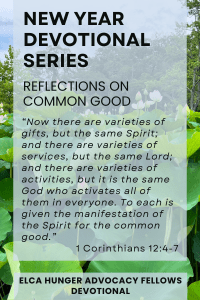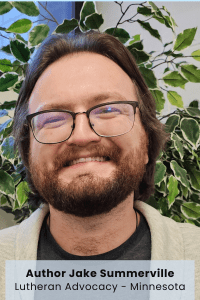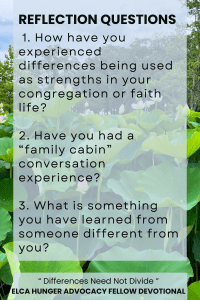By Jake Summerville, Lutheran Advocacy – Minnesota [About the Author]
 In a time as tense and divided as ours, ideas like a united church working together toward a common good feel more and more idealistic. Our neighbors are hurting, yet barbs of hatred and division wound. How can we expect to take any meaningful action?
In a time as tense and divided as ours, ideas like a united church working together toward a common good feel more and more idealistic. Our neighbors are hurting, yet barbs of hatred and division wound. How can we expect to take any meaningful action?
The Corinthian church faced a similar problem. As the early church began to grow, theological and ideological differences began to drive wedges into budding Christian communities, threatening to destroy them before they could truly begin. Paul’s letter in 1 Corinthians served as a stern reminder to them that their differences need not divide them, and in fact are parts of God’s creation.
BRINGING IT ALL TO THE TABLE
We have all been blessed with powerful, meaningful spiritual gifts by the same Spirit. Alone, these gifts can be used to help ourselves, our neighbors and work for the common good. However, changing our and our neighbors’ lives for the better, and actually achieving that common good, requires more than any single one of us can give. We need to work together, not by setting our differences aside, but bringing those differences to the table.
We live in an age where collective good means collective action, and the work of all kinds of spiritual gifts. God’s call to love our neighbor extends to our political lives. Our choice in those that lead us, our opinions on who is deserving of assistance or even basic necessities, and our willingness to stand up to power for the sake of our neighbor are all reflections of our values.
TRIP TO THE FAMILY CABIN
My uncle is a good man. He is a kind, dedicated, hard worker who would do just about anything for the people he loves. He also holds many views that I not only disagree with but find extremely challenging from someone who I love. Over the years, various members of my family, me included, have tried to talk about these issues with him. This has been largely unproductive and has only made any and all political issues banned topics at family gatherings.
views that I not only disagree with but find extremely challenging from someone who I love. Over the years, various members of my family, me included, have tried to talk about these issues with him. This has been largely unproductive and has only made any and all political issues banned topics at family gatherings.
It wasn’t until my fiancé’s first trip to the family cabin that things changed. From inside the cabin, we all watched as my uncle and my fiancé talked animatedly on the deck outside. With bated breath, we waited for the fireworks, and this tension only got worse as we heard the topic of their conversation.
Nearly an hour later, they returned to the group smiling and joking. After the shock wore off, I pulled my fiancé aside and asked how things went. She said that for the first part of their talk, she just asked him questions, made no assumptions, and tried to understand how he had come to his views. By taking the time to listen to his perspective, however strongly she disagreed with him, my fiancé helped him feel heard and seen as someone deserving of dignity and respect.
My uncle’s mind did not change that day, and he is still working through a lot of what he has internalized over the years, but my fiancé set an example for the rest of us and opened up an avenue to talk to one another again. The two of them could not be more different, but she took the time to hear him as a person, not as a political enemy. Though things are still divided among my family, we no longer need to be on the lookout for landmines in our conversations.
WORST ACTION IS TO GIVE UP
The news, social media and so many other massive presences in our lives spin lies that we are too far gone. We are told from all sides that we cannot reconcile our differences, and that our country may simply be too divided to fix. Paul’s letter to the Corinthians reminds us that this is never the truth. We are divided, yes, but the worst thing we can do is give up on each other.
These issues that push us apart, whether they are political, religious, personal or related to our identities, pale in comparison to what brings us together. In my time working in advocacy, I have stood shoulder to shoulder with people whose skin color, gender, age, sexuality, political party or faith background differs from my own. However, in each of these advocates and those we advocate with, that same Holy Spirit is moving. Beneath all the layers that our society tells us must divide us, there is common ground: We are all beloved children of God.
OUR STRENGTH
With this firm foundation to stand on, those things that we have allowed to weaken us, those things that nearly broke the Corinthian church, can be strengths. We can learn from one another, witness each other’s struggles and triumphs, and live in a Christian community that values the Holy Spirit’s presence as we build a society that is diverse, equitable and inclusive.
Advocacy is not a fight against any particular group or political party; to me it is a fight for a better future for all of us. As long as one of us is suffering, there is work to do. I hope that in a media landscape that seems determined to fill our heads with what divides us, we can be encouraged by this passage, our faith journey, and our God that unites us.
ABOUT THE AUTHOR: Jake Summerville (he/him) is a Hunger Advocacy Fellow with Lutheran Advocacy – Minnesota (LA-MN). Summerville was born and raised in the ELCA with a professional background in youth ministry and direct service work. He has just finished up at Luther Seminary and has been approved for ordination as a deacon in the ELCA. Ask him about his fiancé, his cat, the outdoors or Dungeons and Dragons


